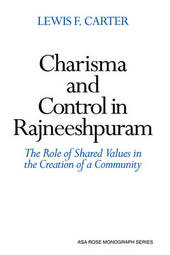
|
Charisma and Control in Rajneeshpuram: A Community without Shared Values
Hardback
Main Details
| Title |
Charisma and Control in Rajneeshpuram: A Community without Shared Values
|
| Authors and Contributors |
By (author) Lewis F. Carter
|
| Series | American Sociological Association Rose Monographs |
|---|
| Physical Properties |
| Format:Hardback | | Pages:344 | | Dimensions(mm): Height 228,Width 152 |
|
| ISBN/Barcode |
9780521385541
|
| Classifications | Dewey:299.93 |
|---|
| Audience | | Tertiary Education (US: College) | | Professional & Vocational | |
|---|
|
Publishing Details |
| Publisher |
Cambridge University Press
|
| Imprint |
Cambridge University Press
|
| Publication Date |
31 August 1990 |
| Publication Country |
United Kingdom
|
Description
Rajneeshpuram, a controversial religious community, transplanted from India to Oregon in 1981, attracted international attention when several of its leaders were arrested in 1985. The spiritual leader, Bhagwan Shree Rajneesh, was deported from the United States and others subsequently served prison terms for arson, poisonings, attempted murder, and other crimes. Rajneesh's followers, called 'sannyasin', are distinguished from other religious groups by their denial of the legitimacy of any moral code for regulating conduct, their rejection of personal constraint by existing human institutions, and the absence of any stable shared system of beliefs. This book is a narrative account of the progressive regimentation of the commune and the escalating hostiles between it and the surrounding communities that led to eventual dismantlement. Based on first-hand observation and interviews, the author describes conditions in the settlement as these evolved through its brief and troubled history. Public documents and historical records reveal that the difficulties encountered by the Rajneesh movement in Oregon were but instances of a recurrent pattern for the group. The author argues that the absence of a shared belief system forces sannyasin community to revert to three 'pre-legal' mechanisms for controlling behaviour: personal confrontation, banishment from the group, and arbitrary charismatic authority. The group's cyclic conflict with their 'host cultures' can be traced to the fact that these control mechanisms allow no accommodation with outsiders. The result is internal regimentation and external contests for absolute dominance. The first comprehensive treatment of the Oregon Rajneesh incident from a sociological perspective, this study offers insights into the importance of shared values for regulating group processes and for negotiating relationships with other groups.
Reviews"The strength of this book is in itis non-judgmental analysis of conflicting social groups." Religious Studies Review "This book is a superior analysis of a minority religious group. Based primarily on archival and secondary sources, the author traces the antecendents, development and collapse of Bagwan Shree Rajneesh's Oregon colony/commune from the viewpoints of its members (sannyasin) and opponents. There is also a discussion of the groups' doctrines and practices." Journal of Church and State "This is the most detailed study to date of the history, institutions, and marketing stratagies of the Rajneesh Movement." Sociological Analysis "The book presents a wealth of information and conjecture abou the Rajneesh movement worldwide, beginning around 1970, as well as about the four-yea communal experiment in Oregon. The study's limitations...should not discourage readers who want to know more about one of North America's largest and most publicized, if short-lived, experiments in utopian community." Utopian Studies
|